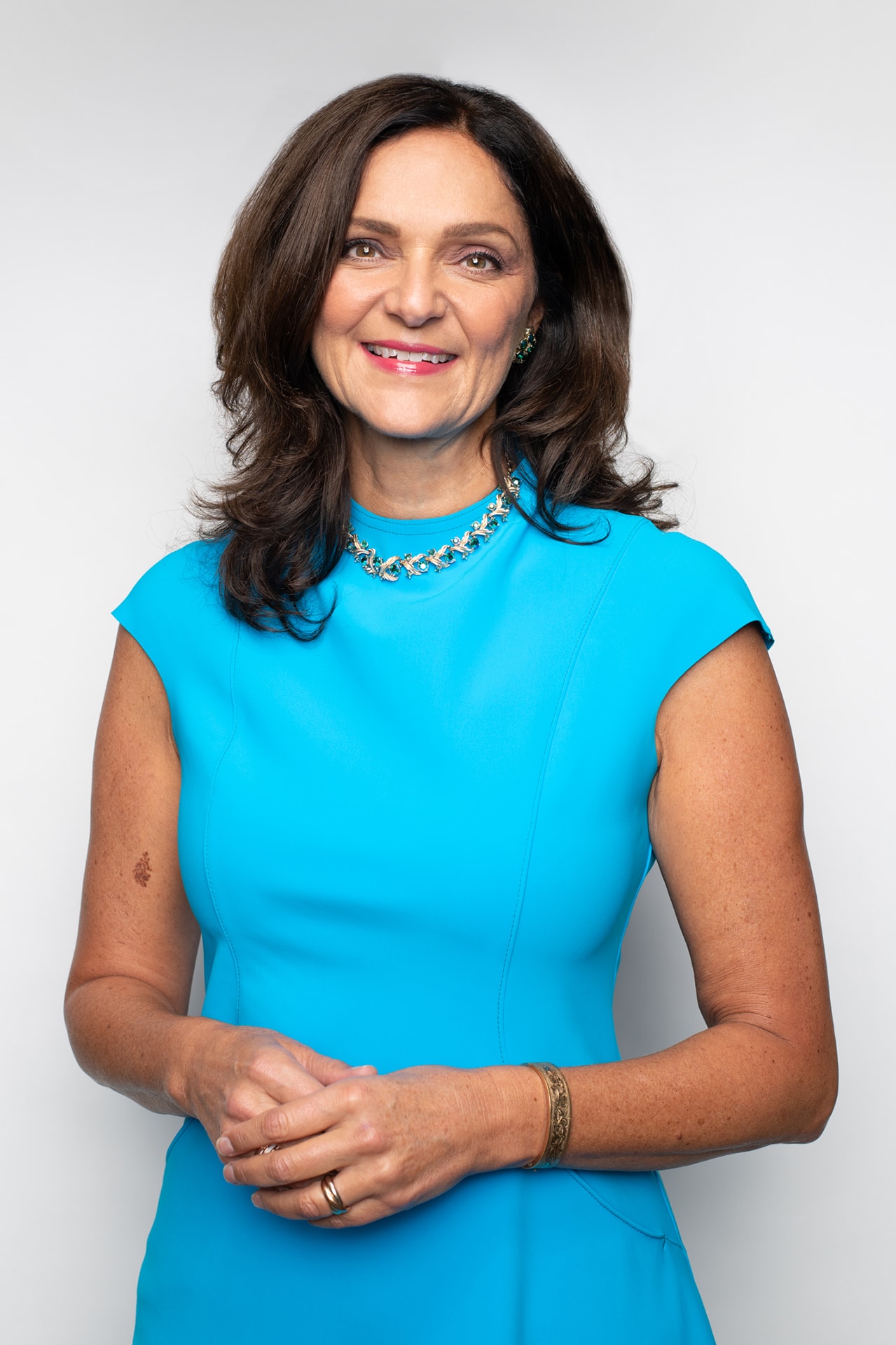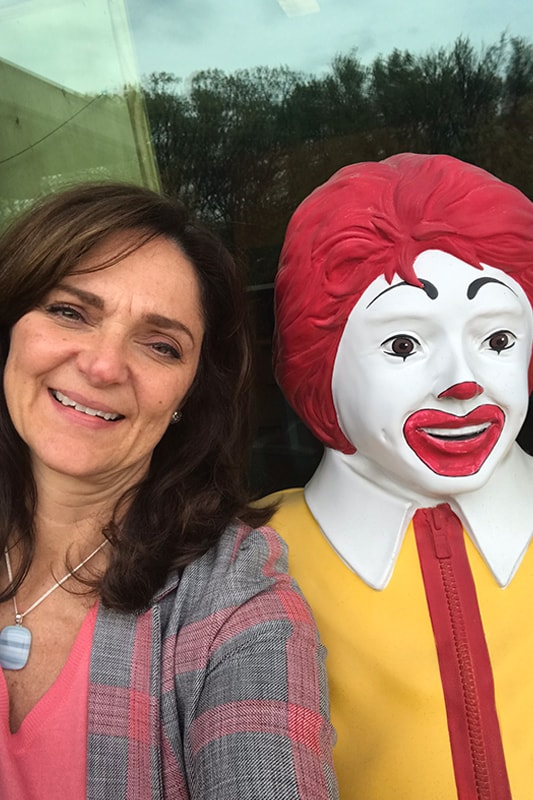
Francesca
DeBiase
Executive Vice President, Chief Supply Chain and Sustainability Officer, McDonald’s Corporation
“When I was young,” says Francesca, “my mom always told me, ‘You’re smart and you’re beautiful and if you work hard, you can do whatever you want.’” Adds Francesca: “And I was naïve enough to believe her.”
Her mother’s words stuck with Francesca, especially given that her mother had dropped out of high school and lied about her age so that she could start work to support the family. Francesca’s grandfather had died when Francesca’s mother was just 10 years old; times were tight. Yet what she emphasized to her only daughter was not lack but abundant choice: “Get out there and change the world.”
Francesca likes to quote Shirley Chisholm, the first Black woman elected to Congress: “If they don’t give you a seat at the table, bring a folding chair.” In college—the first person in her family to attend—Francesca studied business and became a CPA. She started her career working as an auditor for one of the Big Eight accounting firms. She got accustomed to being one of the few women in the room. It didn’t seem an issue.
Then McDonald’s came calling. One of her first jobs for the fast-food giant was as an international accountant, based in Europe. She lived for a time in Poland, directing finance, franchising and supply chain, with signature authority for the company. Every time she went out to ink a real estate contract with a town mayor or other local official, she took along a male interpreter. And every time, the other party assumed that the interpreter was the financial lead. Francesca? She must be just the interpreter.

“It made me take a step back,” says Francesca. “I knew I’d been fortunate to be raised by strong women who worked. I just hadn’t seen the gender disparity personally. And that changed my perspective.”
Also while in Europe, Francesca’s career began shifting direction. She had started out supporting McDonald’s European supply chain team as a finance expert. Gradually, she became part of the supply chain group. Then, when the team leader left, Francesca was promoted to Chief Supply Chain Officer Europe for McDonald’s.
Other changes were also afoot. A new idea had taken root in Europe: sustainability. “You could start to see the change in our customers,” says Francesca. While she was settling into her new role, Greenpeace issued a report critical of the company’s European supply chain practices, linking them with deforestation of the Amazon rainforest. Instead of dismissing the critique, Francesca and McDonald’s head of European communications—another woman—met with Greenpeace. When they did, the data she saw were convincing. “I went back to my supply chain team and said, ‘This could really be happening,’” recalls Francesca. “I asked, ’What else should we know about that we don’t right now?’” An inquiry began. “And that’s how we set up our sustainability organization in Europe,” Francesca says.
The meeting between Greenpeace and McDonald’s started a process that resulted in establishment of the Round Table on Responsible Soy Association, an award-winning global initiative that works to source soy products with minimal environmental impact. It was also part of a continuing change for Francesca. She moved back to the U.S. to head up the global sourcing organization, aware that no one in McDonald’s North American operations knew more about sustainability at that point than she did.
She came in rolling up her sleeves to start a cultural and operational shift at the company. In her current role as Executive Vice President, Chief Supply Chain and Sustainability Officer, Francesca oversees the massive web of suppliers and supplies that serves 68 million McDonald’s customers each day globally via about 39,000 restaurants in more than 100 countries. With that kind of scale, McDonald’s is in rare position to influence global well-being, and Francesca knew it. In 2018, McDonald’s became the first global restaurant organization to set a science-based target for reducing environmental impact across the entire company, including supply chain. By 2030, the company has committed to a 36% cut in its greenhouse gas emissions in restaurants and offices and a 31% reduction in emissions intensity in the supply chain compared to its 2015 levels. The company is also investing in renewable energy sources and promises to eliminate deforestation from its global supply chain in the same timeframe.
“People want to buy from companies that share their values and are doing the right thing,” says Francesca. “I personally believe women are much more thoughtful about how any initiative is going to impact people. And about fifty percent of McDonald’s customers are women. Which means we have a voice.”
She’s working to make that voice heard. “There aren’t a lot of supply chain officers who are women—maybe 8%,” she says. “So, a few years back, I started to look at diversity in my organization. Today, I have what I consider a gender-balanced supply chain at McDonald’s, with between 40% and 60% men and women at all levels in my team, including leadership.”
She has needed all of the gifts that women bring to leadership to guide the company through the COVID-19 pandemic. Thanks to zero breaks in McDonald’s vast global supply chain, 99% of its restaurants have stayed open, creating a level of food security for many during the most uncertain days of the outbreak. At the same time, the company has added many new safety and cleaning protocols to protect both customers and employees.
Says Francesca, “As a country, we are dealing with a string of crises right now—a health crisis, a social crisis, an environmental crisis, and an economic crisis. I think women bring a more caring voice to problem-solving. I think women collaborate more. And we should lean into that. Look at the countries that have been successful in reducing the impact of COVID: They’re all run by women.
“I know I’ve been lucky,” she adds. “I’ve had bosses who said, ‘As a business leader and as a woman, I want you at the table. I need your perspective.’ That doesn’t mean I always feel confident being that voice. When you’re the first woman in the room or the first to do anything, it’s difficult. But I think to myself—and I tell other women this—‘What would your best friend say to you at this moment?’ It would be something like, ‘You’re smart and you know what you’re doing.’ So that’s what I tell myself: These are things women can do.”